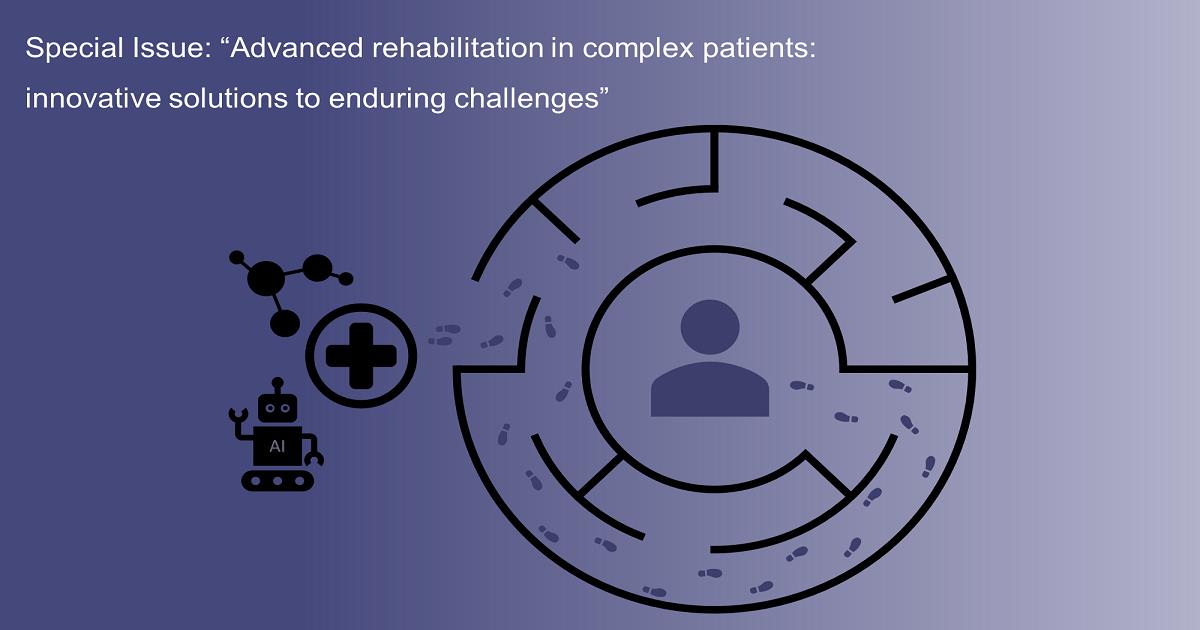- 2.5Impact Factor
- 5.5CiteScore
- 20 daysTime to First Decision
Advanced Rehabilitation in Complex Patients: Innovative Solutions to Enduring Challenges
This special issue belongs to the section “Biomedical Engineering“.
Special Issue Information
Dear Colleagues,
Rehabilitation of complex patients represents one of the most enduring and transversal challenges in modern medicine. Neurological, orthopedic, oncological, rheumatological, and cardiopulmonary conditions are frequently associated with multimorbidity, frailty, and disability, requiring highly personalized and multidisciplinary rehabilitation programs.
The use of quantitative measurement methods certainly allows for precise information to understand the most appropriate treatment approaches; however, the data is often fragmented and difficult to integrate into truly functional clinical reasoning. In this regard, big data analysis and the application of artificial intelligence tools have opened up new perspectives. These allow for the processing of large volumes of clinical, functional, and instrumental data, facilitating the development of predictive outcome models, patient stratification, and the definition of individualized therapeutic strategies. Furthermore, they potentially allow for the identification of response patterns to rehabilitation and the construction of robust data to support evidence-based practices.
This Special Issue will feature original studies, clinical trials, and reviews that delve deeper into the rehabilitation challenges of complex patients and explore how emerging technologies can improve the quality of care. The goal is to stimulate multidisciplinary discussion and promote innovative and sustainable solutions that can transform clinical complexity into opportunities for advancement in rehabilitation medicine.
The main topics include the following:
- New approaches in rehabilitation medicine;
- Robotic and rehabilitation;
- Virtual reality in patients’ treatment;
- Quantitative analysis of neuromuscular function;
- Telemedicine and telerehabilitation of complex patients;
- Computational models in rehabilitation medicine;
- Big data analysis in medicine;
- Artificial intelligence in clinical practice.
Dr. Daniele Coraci
Guest Editor
Manuscript Submission Information
Manuscripts should be submitted online at www.mdpi.com by registering and logging in to this website. Once you are registered, click here to go to the submission form. Manuscripts can be submitted until the deadline. All submissions that pass pre-check are peer-reviewed. Accepted papers will be published continuously in the journal (as soon as accepted) and will be listed together on the special issue website. Research articles, review articles as well as short communications are invited. For planned papers, a title and short abstract (about 250 words) can be sent to the Editorial Office for assessment.
Submitted manuscripts should not have been published previously, nor be under consideration for publication elsewhere (except conference proceedings papers). All manuscripts are thoroughly refereed through a single-blind peer-review process. A guide for authors and other relevant information for submission of manuscripts is available on the Instructions for Authors page. Applied Sciences is an international peer-reviewed open access semimonthly journal published by MDPI.
Please visit the Instructions for Authors page before submitting a manuscript. The Article Processing Charge (APC) for publication in this open access journal is 2400 CHF (Swiss Francs). Submitted papers should be well formatted and use good English. Authors may use MDPI's English editing service prior to publication or during author revisions.
Keywords
- rehabilitation
- neurology
- orthopaedics
- oncology
- rheumathology
- cardiopulmonary conditions
- quantitative measurements
- artificial intelligence
- complex patient
- big data

Benefits of Publishing in a Special Issue
- Ease of navigation: Grouping papers by topic helps scholars navigate broad scope journals more efficiently.
- Greater discoverability: Special Issues support the reach and impact of scientific research. Articles in Special Issues are more discoverable and cited more frequently.
- Expansion of research network: Special Issues facilitate connections among authors, fostering scientific collaborations.
- External promotion: Articles in Special Issues are often promoted through the journal's social media, increasing their visibility.
- e-Book format: Special Issues with more than 10 articles can be published as dedicated e-books, ensuring wide and rapid dissemination.

